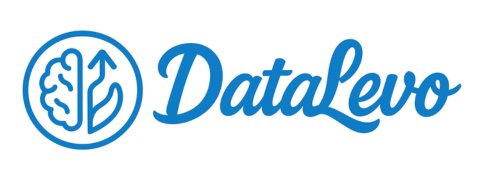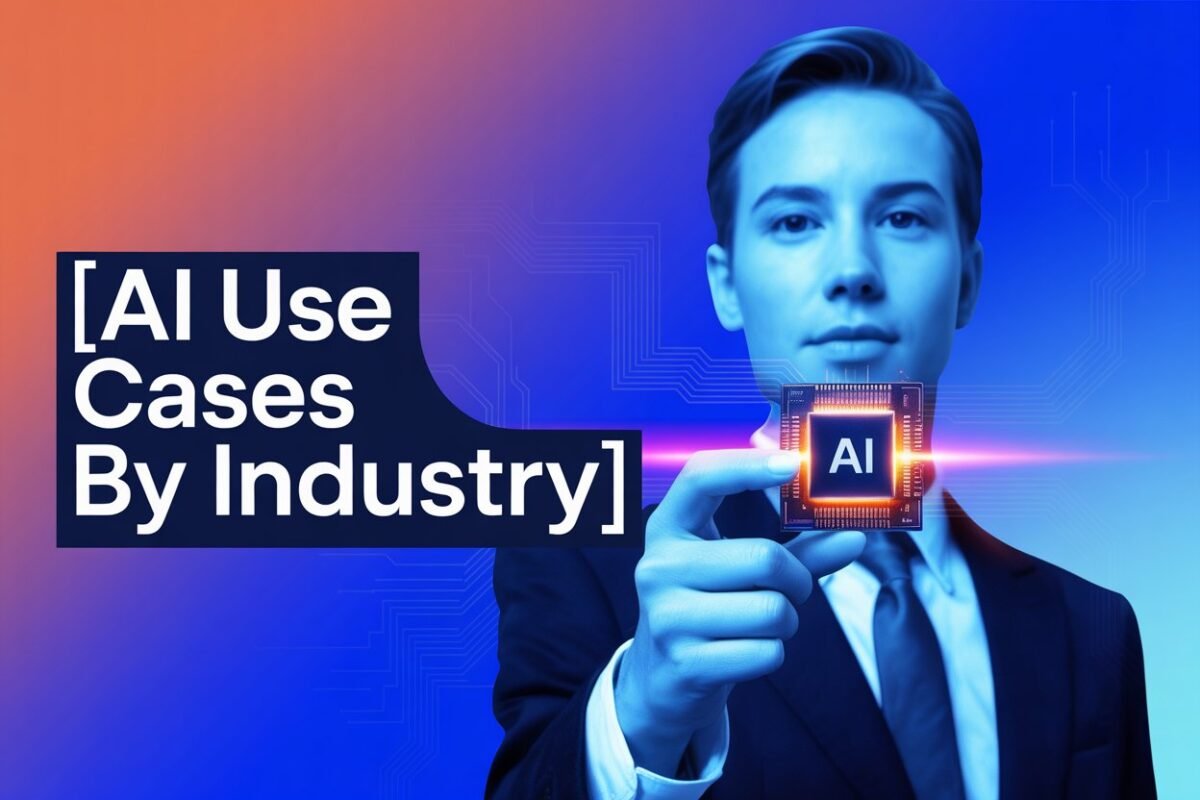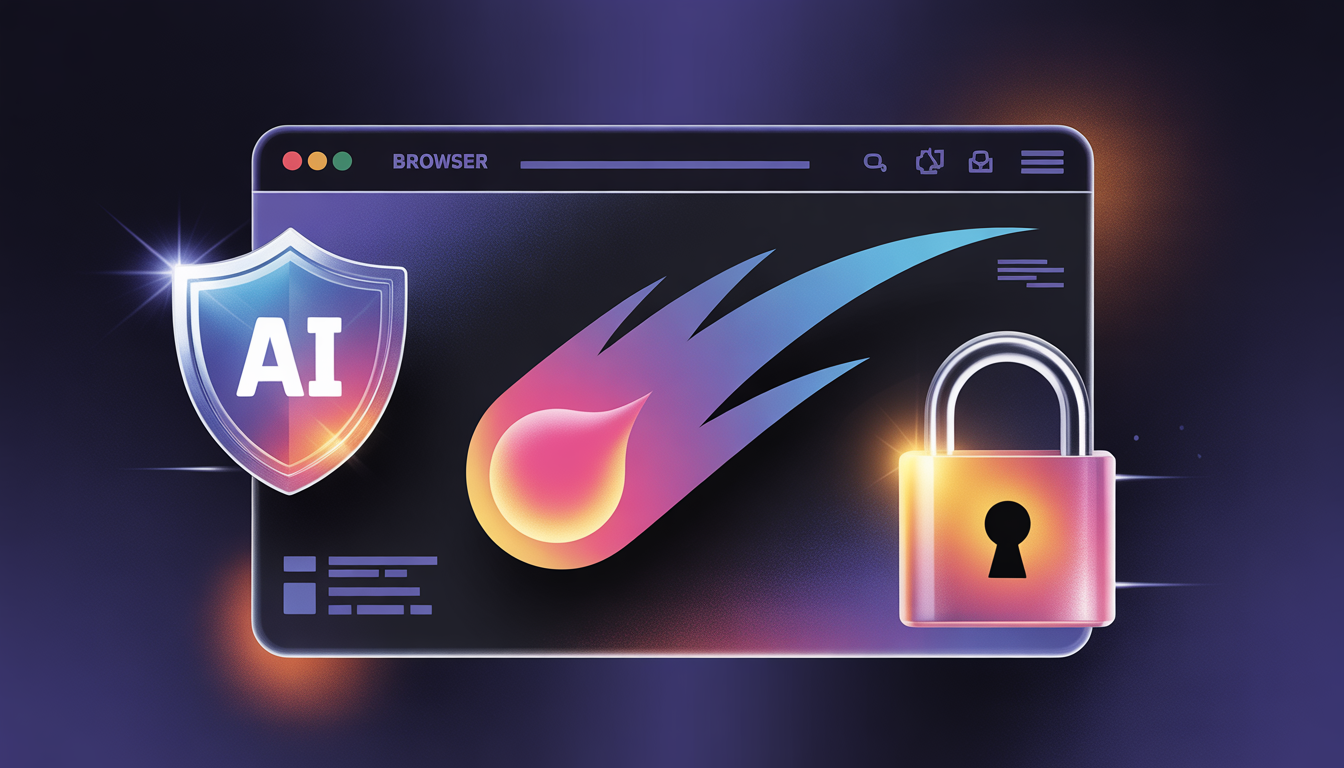Have you ever wondered how artificial intelligence is actually used in the real world? We hear about AI tools everywhere—but when it comes to actual business applications, the picture often gets blurry. Many people still associate AI with sci-fi robots or abstract algorithms, not realizing how deeply it’s shaping everyday industries—from healthcare and finance to education and manufacturing.
The truth is, AI is not just hype. It’s a game-changer. Businesses across the globe are now leveraging AI to streamline operations, personalize experiences, and make faster, smarter decisions. In this guide, we’ll dive deep into AI use cases by industry, giving you a clear and practical view of where AI fits, how it works, and what impact it’s making in different sectors.
Why AI Adoption Is Growing Across Industries
AI adoption is growing across industries due to increased data availability, demand for personalization, cost-efficiency, remote work trends, and the accessibility of no-code AI tools. But why exactly is this happening now? What’s fueling this massive wave of AI adoption?
Let’s break it down in plain English.
1. Data Explosion = AI Opportunity
Over the past decade, companies have collected tons of data—from customer behavior and sales patterns to website traffic and social media engagement. But raw data is useless unless you can make sense of it.
That’s where AI comes in.
AI tools—especially machine learning algorithms—can process and analyze large data sets in ways that humans simply can’t. This allows businesses to uncover insights, trends, and predictions they never had access to before.
💡 Stat: According to IDC, the world will generate over 175 zettabytes of data by 2025, making AI essential for handling and understanding that scale. [Source: IDC Data Age 2025 Report]
2. Demand for Personalization Is Skyrocketing
Today’s customers expect more than generic experiences. Whether they’re shopping online, using a mobile app, or engaging with a brand on social media, they want personalized content, offers, and support—instantly.
AI enables this by analyzing individual behavior and preferences in real time. Retailers, streaming platforms, and even banks now use AI to deliver hyper-personalized experiences.
For example, Netflix uses AI to recommend shows based on your unique viewing history—saving users time and increasing engagement.
3. Need for Efficiency and Cost Reduction
Every business wants to do more with less—less time, fewer resources, lower costs. AI helps companies automate repetitive tasks, streamline workflows, and reduce human error.
From automated customer service chatbots to predictive maintenance in manufacturing, AI improves efficiency while cutting down costs.
💡 Fact: A McKinsey study revealed that businesses using AI in operations report 20–30% cost savings on average. [Source: McKinsey & Company]
Also
AI in Healthcare is used for diagnostics, predictive analytics, virtual assistants, drug discovery, personalized medicine, and robotic surgeries. Source: National Institutes of Health
4. Remote Work & Digital Transformation
Since the COVID-19 pandemic, digital transformation has accelerated at a pace we’ve never seen before. Businesses were forced to rethink how they work, communicate, and deliver value—especially in remote environments.
AI technologies like virtual assistants, automated analytics, and smart collaboration tools have helped companies stay productive and competitive during this shift.
5. AI Is Becoming More Accessible
Not long ago, AI was a luxury only big tech companies could afford. But now? Thanks to platforms like ChatGPT, Midjourney, Jasper, Zapier, and others, even small businesses and solopreneurs can use AI without needing to code or hire data scientists.
Cloud-based tools and APIs have democratized AI—putting powerful capabilities into the hands of everyday users.
🤖 Whether you’re a freelance designer using AI for creative inspiration or a startup automating customer emails—AI is now within reach.
AI in Healthcare
Healthcare is one of the most transformative sectors when it comes to artificial intelligence. From predictive diagnostics to robotic surgeries and personalized treatment plans, AI is redefining how we approach medicine and patient care.
In the past, diagnoses were based largely on a doctor’s experience, patient symptoms, and often, guesswork. But today, AI models can sift through massive datasets—including patient history, imaging scans, and genomic data—to detect diseases more accurately and at earlier stages than ever before.
How is AI used in healthcare?
AI in healthcare is applied in various ways, including:
- Medical Imaging & Diagnostics: AI algorithms, especially deep learning models, are trained to read X-rays, MRIs, and CT scans. Tools like IBM Watson Health and Google DeepMind have demonstrated the ability to detect conditions like cancer, pneumonia, and retinal diseases with higher accuracy than some human radiologists.
- Predictive Analytics: Machine learning models can analyze a patient’s medical history to predict the likelihood of diseases such as diabetes, heart failure, or stroke. This allows doctors to take preventative measures earlier.
- Virtual Health Assistants: AI-powered chatbots and virtual nurses—like Ada or Babylon Health—can handle preliminary diagnostics, remind patients to take medication, and provide real-time health advice, freeing up time for human medical professionals.
- Drug Discovery: Traditional drug development is time-consuming and expensive. AI accelerates this process by identifying potential drug candidates faster using predictive modeling and molecular analysis. Tools like Atomwise use AI to predict how different drugs will interact with targets in the human body.
- Personalized Treatment Plans: AI systems can analyze patient-specific data and recommend tailored treatment strategies. This is especially useful in cancer treatment, where genetic profiles can vary greatly between patients.
- Robotic Surgery: AI-enabled robots assist surgeons in performing precise and minimally invasive procedures. These systems provide real-time data, reduce human error, and improve recovery time.
💡 AI in healthcare improves diagnostic accuracy, accelerates drug discovery, and supports personalized medicine, ultimately enhancing both patient outcomes and healthcare efficiency.
According to a Docwire News, AI outperformed human doctors in diagnosing breast cancer from mammograms with a margin of 11.5% higher accuracy.
Real-World Example: Mayo Clinic
Mayo Clinic utilizes AI for various tasks, including customizing radiation therapy for cancer patients. By analyzing historical treatment data and patient-specific information, AI systems optimize treatment plans, reducing side effects and improving outcomes.
AI in Finance
The finance industry has always been a numbers game—but now, AI is turning data into real-time, actionable insights that help institutions make smarter decisions and protect users from fraud. Whether you’re a fintech startup or a legacy bank, artificial intelligence is no longer optional—it’s essential.
From algorithmic trading and fraud detection to customer service automation, AI is transforming how we save, invest, and secure money. In fact, according to PwC, AI could contribute up to $1.2 trillion to the global financial sector by 2030.
What are the top AI use cases in finance?
- Fraud Detection & Prevention
AI algorithms monitor transactions in real time to detect unusual behavior patterns. When a transaction deviates from a user’s regular behavior—like a sudden large withdrawal from a foreign location—the system instantly flags or blocks it. This minimizes false positives while maintaining high accuracy.
Tools like Kount and Darktrace use machine learning to enhance security layers for online banking and payments. - Credit Risk Assessment
Instead of relying solely on credit history, AI can evaluate an applicant’s full financial behavior—spending habits, savings patterns, even social media usage in some cases—to determine creditworthiness. This gives a broader, more accurate picture, especially for unbanked populations. - Algorithmic Trading
AI-driven trading bots process millions of data points (including news, social sentiment, and stock trends) in milliseconds to make buying or selling decisions. Firms like Renaissance Technologies and Kavout rely on machine learning to outperform traditional strategies. - Customer Service Automation
AI chatbots handle common banking queries such as balance checks, transaction history, or loan inquiries. This improves user experience while reducing the workload on customer service teams.
Banks like Bank of America use AI virtual assistants like Erica to offer personalized financial advice. - RegTech (Regulatory Technology)
AI is used to automate compliance tasks, monitor suspicious activity, and ensure organizations adhere to changing financial regulations. Natural language processing (NLP) tools scan legal documents and flag potential compliance risks.
📌 AI in finance helps institutions prevent fraud, assess creditworthiness, optimize trading strategies, and automate compliance—improving efficiency and user trust.
Real-World Example: JPMorgan Chase
JPMorgan Chase’s COIN platform uses machine learning to review legal documents and interpret commercial-loan agreements. What took lawyers 360,000 hours per year now takes seconds—cutting costs and reducing human error dramatically. Source
AI in Education
The education landscape is undergoing a radical transformation—and AI is the driving force behind it. From personalized learning experiences to automated grading, artificial intelligence is helping educators focus more on teaching while offering students tailored support like never before.
With platforms like Khan Academy, Duolingo, and Socratic integrating AI into their learning models, the days of one-size-fits-all education are fading fast. A report by HolonIQ suggests AI in education will be a $20 billion market by 2027—proof of how rapidly it’s evolving.
How is AI revolutionizing education?
- Personalized Learning Paths
AI analyzes student performance, engagement levels, and behavior to deliver a custom learning journey. It adjusts the difficulty of questions in real-time and provides extra help when needed—similar to having a personal tutor.
Tools like Squirrel AI and Carnegie Learning are leading this adaptive learning revolution. - Automated Grading & Feedback
Teachers spend less time grading and more time teaching. AI can assess multiple-choice quizzes, short answers, and even essays using natural language processing. This not only saves time but also offers consistent, unbiased evaluations.
Platforms like Gradescope help educators scale grading without sacrificing quality. - AI Tutors & Homework Assistance
Apps like Socratic by Google and Photomath use AI to help students understand tough concepts, solve math problems, or even analyze essays. These tools promote independent learning while reducing frustration and burnout. - Predictive Analytics for At-Risk Students
AI tools track student engagement and flag potential dropouts or low performers early. Educators can then intervene with targeted support before it’s too late. This is particularly powerful for online learning platforms and large classrooms. - Language Learning & Translation
With AI-powered speech recognition and real-time translation, language learning has never been more interactive. Tools like Duolingo and Lingvist provide immediate pronunciation feedback, track fluency progress, and adjust lessons dynamically.
📌 AI in education enables personalized learning, automates grading, supports teachers, and identifies students who need help—making education more inclusive and effective.
Real-World Example: Khan Academy + GPT-4
Khan Academy has partnered with OpenAI to create Khanmigo, an AI-powered tutor that can guide students through complex problems, offer Socratic questioning, and even provide emotional encouragement—like a patient mentor available 24/7. Source Khanmigo
AI in Marketing
Marketing has undergone a major evolution thanks to AI—and it’s no longer just about ad targeting. From personalizing emails to predicting customer behavior, AI empowers marketers to connect with their audiences in smarter, more meaningful ways.
Today’s AI marketing tools don’t just automate tasks; they actually enhance creativity and decision-making. According to Salesforce’s State of Marketing Report, 84% of marketers are already using AI—especially for content creation and customer segmentation.
Major AI Use Cases in Marketing:
- Customer Segmentation & Behavior Prediction
AI tools like Segment and Optimove analyze browsing habits, purchase history, and engagement data to automatically group audiences. This helps marketers send the right message to the right person—at the right time. - AI Copywriting & Content Generation
Platforms like Jasper and Copy.ai generate high-converting headlines, product descriptions, and social media posts within seconds. These tools save time and increase output—without losing creativity. - Predictive Lead Scoring
AI helps prioritize leads based on how likely they are to convert. Tools like HubSpot AI and Marketo Engage assess engagement levels and purchase intent automatically. - Chatbots & Customer Support
AI-powered bots such as Drift and Intercom handle FAQs, schedule demos, and nurture leads 24/7—offering instant, on-brand interactions at scale. - AI in SEO & Personalization
Tools like Surfer SEO and Clearscope optimize blog content using AI-driven keyword suggestions. Meanwhile, platforms like Dynamic Yield customize website experiences for each visitor in real-time.
🧠 AI in marketing enables hyper-personalized campaigns, real-time audience insights, and data-driven creativity—boosting ROI and reducing guesswork.
AI in Retail
In the fast-paced retail world, AI is the secret sauce behind many of the experiences we now take for granted—like personalized product recommendations, cashier-less checkouts, and dynamic pricing. Retailers are using AI not just to sell more but to serve better.
In fact, McKinsey reports that AI adoption in retail could increase operating margins by up to 60%, especially in areas like inventory planning and marketing personalization.
How Retailers Are Using AI:
- Product Recommendations
Ever noticed how Amazon or Netflix seems to know what you’ll want next? That’s AI. Recommendation engines like Salesforce Einstein analyze your behavior and match you with similar users to suggest the most relevant items. - Customer Support with AI Chatbots
Tools like LivePerson or Ada are handling thousands of support queries 24/7. They’re trained on real conversations to solve problems faster—and they’re getting smarter over time. - Inventory Management & Demand Forecasting
AI helps stores keep the right amount of stock at the right time. Tools like Relex Solutions analyze sales patterns, seasons, and even weather forecasts to predict what will sell. - Visual Search & Virtual Try-Ons
With AI-powered tools like Vue.ai and Snap’s AR Shopping, customers can search for clothes by uploading photos—or try on sunglasses and makeup virtually, all from their phone. - Dynamic Pricing
Retailers like Walmart and Zara use AI to adjust prices in real-time based on competitor pricing, demand surges, or overstock situations—helping increase sales and reduce waste.
🛍️ AI in retail personalizes the shopping experience, improves operational efficiency, and makes every interaction feel tailor-made.
AI in Manufacturing
Manufacturing is undergoing a digital revolution, and AI is right at the heart of it. From predictive maintenance to quality control and supply chain optimization, AI is turning factories into intelligent, self-learning environments.
A report by National University found that AI could contribute up to $3.8 trillion in added value to the global manufacturing industry by 2030. That’s not just hype—it’s real impact driven by smarter, more adaptive production lines.
Source: National University
Key AI Use Cases in Manufacturing:
- Predictive Maintenance
Instead of waiting for machines to break, AI systems like Uptake or SparkCognition monitor equipment in real time and alert engineers before a failure happens. This reduces unplanned downtime by up to 50%, saving millions in potential losses. - Computer Vision for Quality Control
AI-driven cameras and visual inspection tools can detect microscopic flaws in products with near-perfect accuracy. Platforms like Landing AI and Neurala help factories maintain high-quality standards and reduce returns. - Supply Chain Optimization
AI helps manufacturers forecast demand, manage inventory, and optimize logistics. Tools like Llamasoft and Kinaxis use machine learning to simulate various market scenarios, allowing companies to plan more efficiently. - Process Automation & Robotics
AI-powered robots (cobots) work alongside humans to speed up production tasks. With reinforcement learning, these robots improve over time, adapting to changes in materials or product designs. - Energy Efficiency & Sustainability
AI tools help monitor and optimize energy usage across factories. Companies like Seebo offer AI-driven sustainability analytics that help reduce energy waste, emissions, and costs.
🏭 In essence: AI is transforming traditional manufacturing into a lean, efficient, and intelligent system that minimizes waste and maximizes output.
Conclusion
As we’ve explored across various industries—from healthcare to finance, retail to manufacturing—AI is not just a futuristic concept anymore. It’s already reshaping the way businesses operate, make decisions, and serve their customers.
The biggest takeaway? Artificial intelligence is only as powerful as the way it’s applied. Its true potential lies not in flashy tools or hype, but in solving real-world problems that impact daily life, industry outcomes, and global innovation.
Whether it’s diagnosing diseases faster, streamlining logistics, or delivering hyper-personalized shopping experiences, AI is becoming the invisible engine behind efficiency and growth. And as models become more sophisticated and data more accessible, we can expect AI use cases to deepen and diversify across every sector.
If you’re a business owner, marketer, developer, or entrepreneur, now’s the time to explore how AI can work for your industry. The more tailored your AI implementation is to your unique challenges, the more value you’ll unlock.
👉 Want to learn how to get started with the right AI tools for your needs?
Check out our guide: How to Choose the Right AI Tool for You
Or explore more insights from trusted resources like McKinsey’s Global AI Report and PwC’s AI Industry Outlook.
FAQs
1. What industries are using AI the most today?
AI is widely used in healthcare, finance, manufacturing, retail, and logistics. These sectors leverage AI for automation, data analysis, customer experience, and operational efficiency.
2. How is AI used in the healthcare industry?
AI in healthcare is used for disease diagnosis, medical imaging, drug development, and patient monitoring. It helps doctors make faster, more accurate decisions.
3. What is an example of AI in the financial industry?
In finance, AI is used for fraud detection, algorithmic trading, risk assessment, and personalized banking. AI helps detect suspicious transactions in real time.
4. Is AI replacing jobs in different industries?
AI is automating repetitive tasks but also creating new roles in data science, AI development, and strategic analysis. It’s reshaping job responsibilities, not just removing them.
5. Can small businesses use AI effectively?
Yes, small businesses can use AI tools for customer support, marketing automation, and data analysis. Many affordable platforms make AI accessible to all business sizes.



